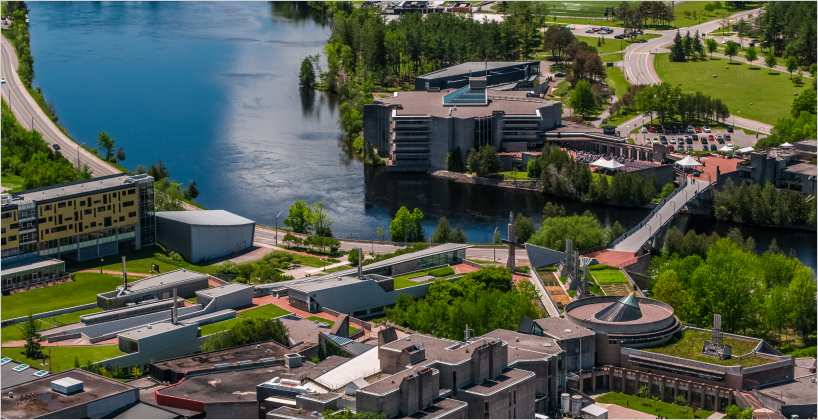Table of contents
Becoming a lawyer in Ontario, Canada, is a rewarding yet demanding journey that requires dedication, perseverance, and a solid educational foundation. With a legal system rooted in both common law and civil law traditions, aspiring lawyers in Ontario must navigate through rigorous academic requirements, professional examinations, and practical training. This comprehensive guide outlines the steps to become a lawyer in Ontario and Canada, along with a list of esteemed law schools across the nation.
Preparing in High School
Preparing to become a lawyer while still in high school is an advantageous endeavor that lays a strong foundation for a future legal career. To embark on this path, high school students can start by focusing on developing strong academic skills, particularly in subjects such as English, history, government, and social sciences, which provide a solid foundation for legal studies.
Engaging in extracurricular activities such as debate clubs, mock trial teams, or public speaking competitions can enhance communication and critical thinking skills, essential qualities for success in the legal field. Additionally, seeking out volunteer opportunities with legal organizations or participating in internships can provide valuable exposure to the legal profession and help students gain insight into the day-to-day work of lawyers.
Building a network of mentors and professionals in the legal field, staying informed about current legal issues, and preparing for standardized tests such as the LSAT can also contribute to a successful transition to law school. By proactively engaging in these activities and maintaining a strong academic record, high school students can lay a solid groundwork for a future career as a lawyer.
Pathways to Becoming a Lawyer in Ontario and Canada
1. Obtain a Bachelor’s Degree: Before pursuing legal education, aspiring lawyers must complete a bachelor’s degree from a recognized university. While there’s no specific undergraduate major required, courses in political science, history, economics, or philosophy can provide a strong foundation for legal studies.
2. Complete the Law School Admission Test (LSAT): The LSAT is a standardized test that assesses critical thinking, logical reasoning, and reading comprehension skills. A competitive LSAT score is essential for admission to law schools in Ontario and Canada.
3. Earn a Law Degree: In Ontario, aspiring lawyers must complete a Juris Doctor (JD) degree from a recognized law school. The JD program typically spans three years and covers a wide range of legal subjects, including constitutional law, criminal law, and contracts.
4. Articling and Licensing Process: After completing law school, graduates must complete a period of articling, which involves practical training under the supervision of a licensed lawyer or judge. Following articling, aspiring lawyers must pass the Barrister and Solicitor examinations conducted by the Law Society of Ontario to obtain their license to practice law.
5. Continued Professional Development: Once licensed, lawyers in Ontario must fulfill continuing professional development (CPD) requirements, which include participating in educational programs and activities to maintain their legal competence.
Law Schools in Ontario and Canada
With a robust and diverse legal education landscape, Canada boasts a total of 21 esteemed law schools across the country. From coast to coast, aspiring lawyers have a multitude of options to pursue their legal studies, each offering unique programs and opportunities for academic and professional growth. Whether situated in bustling urban centers or serene campus settings, these institutions play a vital role in shaping the next generation of legal professionals, fostering innovation, excellence, and a commitment to justice within Canada’s legal system.
- University of Alberta Faculty of Law
- University of British Columbia Peter A. Allard School of Law
- University of Calgary Faculty of Law
- Dalhousie University Schulich School of Law
- University of Manitoba Faculty of Law
- McGill University Faculty of Law
- Université de Moncton Faculté de droit
- Université de Montréal Faculté de droit
- University of New Brunswick Faculty of Law
- University of Ottawa Faculty of Law
- Queen’s University Faculty of Law
- University of Saskatchewan College of Law
- Université de Sherbrooke Faculté de droit
- Thompson Rivers University Faculty of Law
- University of Toronto Faculty of Law
- University of Victoria Faculty of Law
- Western University Faculty of Law
- University of Windsor Faculty of Law
- York University Osgoode Hall Law School
- University of British Columbia Faculty of Law (Allard Hall)
- Ryerson University Faculty of Law
Law Schools in Ontario
There are 7 law schools in Ontario, they are the following:
- Osgoode Hall Law School – York University: Located in Toronto, Osgoode Hall Law School is one of the oldest and most prestigious law schools in Canada. Offering a diverse range of programs, including JD, LLM, and PhD, Osgoode provides students with a comprehensive legal education.
- University of Toronto Faculty of Law: As one of the top-ranked law schools globally, the University of Toronto Faculty of Law offers JD programs renowned for their academic excellence and innovative curriculum. Situated in the heart of downtown Toronto, the Faculty of Law provides students with access to a vibrant legal community.
- Queen’s University Faculty of Law: Located in Kingston, Ontario, Queen’s University Faculty of Law offers a JD program known for its rigorous academic standards and supportive learning environment. With a strong emphasis on experiential learning, Queen’s Law prepares students for successful legal careers.
- Western University Faculty of Law: Western University’s Faculty of Law, situated in London, Ontario, offers a JD program that emphasizes both theoretical knowledge and practical skills. With innovative clinics and externship opportunities, Western Law equips students with real-world legal experience.
- University of Ottawa Faculty of Law: The University of Ottawa Faculty of Law, located in the capital city, offers bilingual JD programs in both English and French. With its unique focus on social justice and legal pluralism, uOttawa Law fosters a diverse and inclusive learning environment.
- University of Windsor Faculty of Law: Renowned for its commitment to access to justice and community engagement, the University of Windsor Faculty of Law offers JD programs that integrate theoretical learning with practical experience. Situated in Windsor, Ontario, the Faculty of Law is a hub for legal innovation and advocacy.
- Ryerson University Faculty of Law: As one of the newest additions to Ontario’s legal education landscape, Ryerson University’s Faculty of Law offers innovative JD programs designed to prepare students for the evolving legal profession. Located in downtown Toronto, Ryerson Law emphasizes technology, entrepreneurship, and social justice.
Law Schools in Alberta
Alberta, a province known for its dynamic economy and stunning landscapes, is home to two prominent law schools offering comprehensive legal education and training. These institutions, situated in vibrant urban centers, provide aspiring lawyers with the tools, resources, and opportunities necessary to excel in the legal profession.
University of Alberta Faculty of Law: The University of Alberta Faculty of Law, located in Edmonton, is one of Canada’s leading law schools. Renowned for its academic excellence and innovative research, the Faculty offers a comprehensive legal education with a strong emphasis on experiential learning and interdisciplinary collaboration. With a diverse range of programs, clinical opportunities, and supportive faculty, students at the University of Alberta Faculty of Law are well-equipped to succeed in the legal profession.
University of Calgary Faculty of Law: Situated in Calgary, the University of Calgary Faculty of Law is recognized for its forward-thinking approach to legal education and commitment to social justice. Offering a JD program renowned for its practical focus and hands-on learning opportunities, the Faculty prepares students for diverse legal careers in a rapidly changing world. With its strong ties to the local legal community and vibrant energy sector, the University of Calgary Faculty of Law provides students with unique networking and career development opportunities.
Law Schools in British Columbia
British Columbia, a province known for its stunning landscapes and vibrant communities, is home to two esteemed law schools that offer comprehensive legal education and training: the Peter A. Allard School of Law at the University of British Columbia (UBC) and the Thompson Rivers University Faculty of Law. Situated in dynamic urban centers, these institutions provide aspiring lawyers with the tools, resources, and opportunities necessary to excel in the legal profession.
Peter A. Allard School of Law at the University of British Columbia (UBC): Situated in Vancouver, the Peter A. Allard School of Law is renowned for its academic excellence, innovative research, and commitment to social justice. Offering a range of programs including JD, LLM, and PhD degrees, the Allard School provides students with a rigorous legal education in a vibrant urban setting. With its strong ties to the local legal community and global network of alumni, the Allard School of Law offers students unique opportunities for networking, mentorship, and career development.
Thompson Rivers University Faculty of Law: Located in Kamloops, the Thompson Rivers University Faculty of Law is known for its innovative approach to legal education and focus on experiential learning. With small class sizes and personalized instruction, the Faculty provides students with a supportive and collaborative learning environment. Through clinical programs, externships, and community-based projects, students at TRU Law gain practical experience and make a positive impact in the community.
Law Schools in Manitoba
Manitoba, located in the heart of Canada, is home to one esteemed law school that provides comprehensive legal education and training: the Robson Hall Faculty of Law at the University of Manitoba. Situated in the vibrant city of Winnipeg, Robson Hall is renowned for its academic excellence, commitment to social justice, and strong ties to the local legal community.
The Robson Hall Faculty of Law at the University of Manitoba: stands as a cornerstone of legal education in Canada’s heartland. Located in Winnipeg, this esteemed institution is renowned for its commitment to excellence, innovation, and community engagement. Offering a comprehensive range of programs, including JD, LLM, and PhD degrees, Robson Hall provides students with a supportive and intellectually stimulating learning environment. With a strong emphasis on experiential learning, interdisciplinary collaboration, and access to justice initiatives, Robson Hall equips graduates with the knowledge, skills, and values necessary to excel in the legal profession and make a positive impact in Manitoba and beyond.
Law School in Saskatchewan
University of Saskatchewan College of Law – Located in Saskatoon, Saskatchewan, the College of Law offers a JD program with a strong emphasis on Indigenous legal issues, natural resources law, and access to justice initiatives.
Law Schools in Maritime Provinces
- Dalhousie University Schulich School of Law – Located in Halifax, Nova Scotia, the Schulich School of Law offers a comprehensive legal education with a focus on experiential learning and social justice.
- University of New Brunswick Faculty of Law – Situated in Fredericton, New Brunswick, the UNB Faculty of Law provides students with a rigorous legal education emphasizing practical skills development and community engagement.
- University of Prince Edward Island School of Law – Located in Charlottetown, Prince Edward Island, the UPEI School of Law offers a JD program with a strong emphasis on small class sizes, personalized instruction, and experiential learning opportunities.
- Schulich School of Law at Dalhousie University – Located in Halifax, Nova Scotia, the Schulich School of Law offers a JD program known for its interdisciplinary approach, innovative curriculum, and commitment to social justice.
- Memorial University Faculty of Law – Situated in St. John’s, Newfoundland and Labrador, the MUN Faculty of Law offers a JD program with a focus on legal research, writing, and advocacy skills development.
These law schools offer diverse programs and opportunities for aspiring lawyers in regions across Canada, contributing to the rich tapestry of legal education in the country.
Becoming a lawyer in Ontario and Canada requires dedication, academic excellence, and practical training. By following the outlined pathway and pursuing legal education at one of the esteemed law schools in the province, aspiring lawyers can embark on a fulfilling and impactful legal career. Whether advocating for justice, shaping public policy, or advising clients, lawyers play a vital role in upholding the rule of law and advancing the principles of justice and fairness in society.





